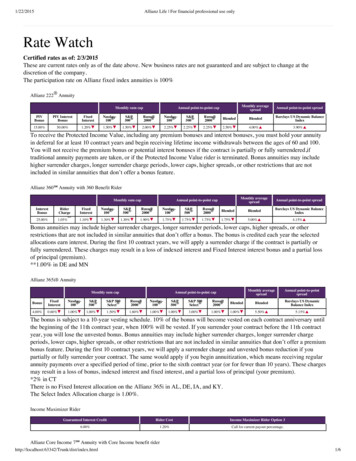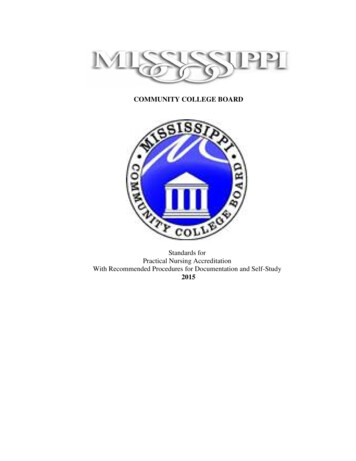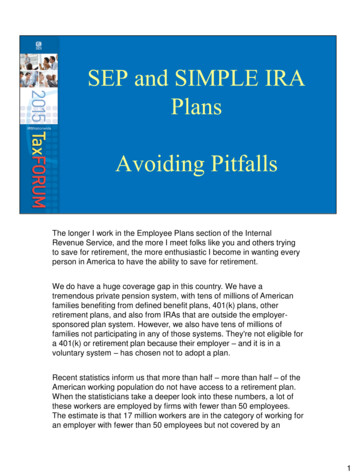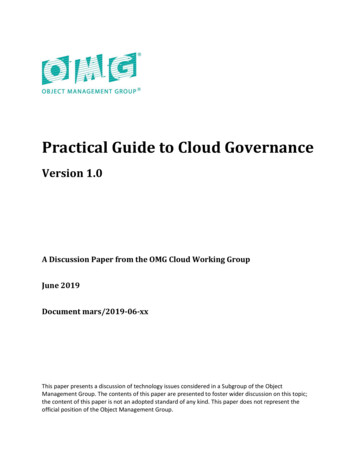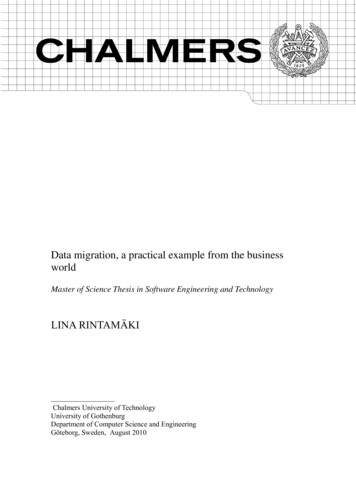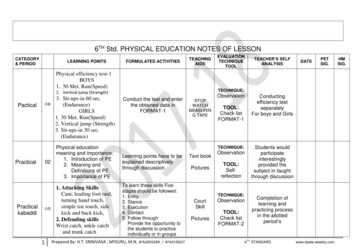
Transcription
“Simple. Practical. Helpful. In Habits of Grace, Mathis writes brilliantly aboutthree core spiritual disciplines that will help us realign our lives and strengthenour faith. In a world where everything seems to be getting more complicated,this book will help us to downshift and refocus on the things that mattermost.”Louie Giglio, Pastor, Passion City Church, Atlanta; Founder,Passion Conferences“Although this little book says what many others say about Bible reading,prayer, and Christian fellowship (with two or three others tacked on), its greatstrength and beauty is that it nurtures my resolve to read the Bible and it makesme hungry to pray. If the so-called ‘means of grace’ are laid out as nothingmore than duties, the hinge of sanctification is obligation. But in this case, themeans of grace are rightly perceived as gracious gifts and signs that God isat work in us, which increases our joy as we stand on the cusp of Christianfreedom under the glories of King Jesus.”D. A. Carson, Research Professor of New Testament,Trinity Evangelical Divinity School; cofounder, The Gospel Coalition“Most people assume that disciplined training is necessary for attaining anyskill—professional, academic, or athletic. But for some reason, Christians donot see this principle applying to their Christian lives. In his excellent book,Habits of Grace, David Mathis makes a compelling case for the importanceof the spiritual disciplines, and he does so in such a winsome way that willmotivate all of us to practice the spiritual disciplines of the Christian life. Thisbook will be great both for new believers just starting on their journey and asa refresher course for those of us already along the way.”Jerry Bridges, author, The Pursuit of Holiness“David Mathis has more than accomplished his goal of writing an introduction to the spiritual disciplines. What I love most about the book is howMathis presents the disciplines—or ‘means of grace’ as he prefers to describethem—as habits to be cultivated in order to enjoy Jesus. The biblical practicesMathis explains are not ends—that was the mistake of the Pharisees in Jesus’sday and of legalists in our time. Rather they are means by which we seek,savor, and enjoy Jesus Christ. May the Lord use this book to help you placeyourself ‘in the way of allurement’ that results in an increase of your joy inJesus.”Donald S. Whitney, Associate Professor of Biblical Spirituality,Senior Associate Dean of the School of Theology, The SouthernBaptist Theological Seminary; author, Spiritual Disciplines for theChristian Life
“So often as we consider the spiritual disciplines, we think of what we mustdo individually. Mathis takes a different approach that is both insightful andrefreshing. Along with our personal time of prayer and reading, we are encouraged to seek advice from seasoned saints, have conversations about Bible studywith others, and pray together. The Christian life, including the disciplines,isn’t meant to be done in isolation. Mathis’s depth of biblical knowledge alongwith his practical guidance and gracious delivery will leave you eager to pursuethe disciplines, shored up by the grace of God.”Trillia Newbell, author, United: Captured by God’s Vision forDiversity and Fear and Faith“This is the kind of book I turn to periodically to help examine and recalibratemy heart, my priorities, and my walk with the Lord. David Mathis has given usa primer for experiencing and exuding ever-growing delight in Christ throughgrace-initiated intentional habits that facilitate the flow of yet fuller springs ofgrace into and through our lives.”Nancy Leigh DeMoss, author; radio host, Revive Our Hearts“There is not a Christian in the world who has mastered the spiritual disciplines. In fact, the more we grow in grace, the more we realize how little weknow of hearing from God, speaking to God, and meditating on God. Ourmaturity reveals our inadequacy. Habits of Grace is a powerful guide to thespiritual disciplines. It offers basic instructions to new believers while bringingfresh encouragement to those who have walked with the Lord for many years.It is a joy to commend it to you.”Tim Challies, author, The Next Story; blogger, Challies.com“When I was growing up, spiritual disciplines were often surrounded by anair of legalism. But today the pendulum has swung in the other direction: itseems that family and private devotions have fallen off the radar. The veryword habits can be a turnoff, especially in a culture of distraction and autonomy. Yet character is largely a bundle of habits. Christ promises to blessus through his means of grace: his Word preached and written, baptism, andthe Lord’s Supper. Like a baby’s first cry, prayer is the beginning of that life ofresponse to grace given, and we never grow out of it. Besides prayer, there areother habits that grace motivates and shapes. I’m grateful for Habits of Gracebringing the disciplines back into the conversation and, hopefully, back intoour practice as well.”Michael Horton, J. Gresham Machen Professor of Systematic Theologyand Apologetics, Westminster Seminary California; author, Calvin onthe Christian Life
“David Mathis has given us a book on the spiritual disciplines that is practical, actionable, and accessible. He speaks with a voice that neither scolds noroverwhelms, offering encouragement through suggestions and insights to helpeven the newest believer find a rhythm by which to employ these means ofgrace. A treatment of the topic that is wonderfully uncomplicated and thorough, Habits of Grace offers both a place to start for beginners and a path togrow for those seasoned in the faith.”Jen Wilkin, author, Women of the Word; Bible study teacher“I am drawn to books that I know are first lived out in the messiness of lifebefore finding their way onto clean sheets of paper. This is one of those books!David has found a well-worn path to Jesus through the habits of grace hecommends to us. I am extremely grateful for David’s commitment to take thetimeless message in this book and communicate it in language that is winsometo the mind and warm to the heart. This book has the breadth of a literaturereview that reads like a devotional. I am eager to get it into the hands of ourcampus ministry staff and see it being read in dorm rooms and student centersacross the country.”Matt Bradner, Regional Director, Campus Outreach“David Mathis has provided us with a gospel-driven, Word-centered, Christexalting vision of Christian spiritual practices. Furthermore, he understandsthat sanctification is a community project: the local church rightly looms largein Habits of Grace. This book is perfect for small group study, devotionalreading, or for passing on to a friend who is thinking about this topic for thefirst time. I give it my highest recommendation.”Nathan A. Finn, Dean, The School of Theology and Missions,Union University
Habits of GraceEnjoying Jesus through theSpiritual DisciplinesDavid MathisForeword by John Piper W H E AT O N , I L L I N O I S
Habits of Grace: Enjoying Jesus through the Spiritual DisciplinesCopyright 2016 by David C. MathisPublished by Crossway1300 Crescent StreetWheaton, Illinois 60187All rights reserved. No part of this publication may be reproduced, storedin a retrieval system, or transmitted in any form by any means, electronic,mechanical, photocopy, recording, or otherwise, without the prior permission ofthe publisher, except as provided for by USA copyright law.Cover design: Jeff Miller, Faceout StudioCover image: Benjamin DevineFirst printing 2016Printed in the United States of AmericaScripture quotations are from the ESV Bible (The Holy Bible, English StandardVersion ), copyright 2001 by Crossway, a publishing ministry of Good NewsPublishers. Used by permission. All rights reserved.All emphases in Scripture quotations have been added by the author.Trade paperback ISBN: 978-1-4335-5047-8ePub ISBN: 978-1-4335-5050-8PDF ISBN: 978-1-4335-5048-5Mobipocket ISBN: 978-1-4335-5049-2Library of Congress Cataloging-in-Publication DataMathis, David, 1980–Habits of grace : enjoying Jesus through the spiritualdisciplines / David Mathis ; foreword by John Piper.pages cmIncludes bibliographical references and index.ISBN 978-1-4335-5047-8 (tp)1. Spiritual life—Christianity. 2. Christian life. I. Title.BV4501.3.M284 2016248.4'6—dc23 2015023865Crossway is a publishing ministry of Good News Publishers.LB1514261325122411231022921 20 198 7 6 518 17 164 3 2 1
To Carson and ColemanMay he give you a palatefor the ancient recipes
ContentsForeword by John Piper 11Preface 15Introduction: Grace Gone Wild 21Part 1H E AR HIS VOI C E ( W O R D)1 Shape Your Life with the Words of Life 372 Read for Breadth, Study for Depth 433 Warm Yourself at the Fire of Meditation 554 Bring the Bible Home to Your Heart 615 Memorize the Mind of God 676 Resolve to Be a Lifelong Learner 83Part 2H AVE H IS E AR ( P R AY ER )7 Enjoy the Gift of Having God’s Ear 938 Pray in Secret 999 Pray with Constancy and Company 10710 Sharpen Your Affections with Fasting 117
11 Journal as a Pathway to Joy 12712 Take a Break from the Chaos 137Part 3BEL ONG T O H I S BO DY ( F ELLO W S HI P)13 Learn to Fly in the Fellowship 14514 Kindle the Fire in Corporate Worship 15515 Listen for Grace in the Pulpit 16516 Wash in the Waters Again 17317 Grow in Grace at the Table 17918 Embrace the Blessing of Rebuke 185Part 4CO DA19 The Commission 19720 The Dollar 20521 The Clock 211Epilogue: Communing with Christ on a Crazy Day 219Thanks 225General Index 229Scripture Index 233
Forewordby John PiperI don’t even think David intended this, but his title and subtitle are a chiasm. And I like it so much, I’m going to buildmy foreword around it. A chiasm (taken from the Greek letterchi, which looks like an X) is a sequence of thoughts in whichthe first and last member correspond, and the second andsecond-to-last member correspond, and so on, with a hingethought in the middle. So the title of the book looks like thisin a chiasm:Habitsof Grace:Enjoying Jesusthrough the SpiritualDisciplinesHabits corresponds to Disciplines. Grace corresponds to Spiritual. And Enjoying Jesus is the hinge. This is loaded with implications for why David’s book is worth reading.The chiasm, and the book, and the theology behind itdemand that enjoying Jesus be the hinge. But “hinge” only
12Forewordsignifies the swing position in the middle of the other thoughts.There is always more to it than that. In this case, the hinge isthe goal of all the rest.David is writing a book to help you enjoy Jesus. In doingthat, he is not trying to be nice. He’s trying to be nuclear. Hisway of thinking about enjoying Jesus is explosive. If you enjoyJesus more than life (Matt. 10:38), you will live with a radicalabandon for Jesus that will make the world wonder. Enjoyment of Jesus is not like icing on the cake; it’s like powder inthe shell.Not only is enjoying Jesus explosively transforming in theway we live; it is also essential for making Jesus look great.And that is why we have the Holy Spirit. Jesus said the Spiritcame to glorify him (John 16:14). The primary mission of theSpirit—and his people—is to show that Jesus is more glorious than anyone or anything else. It cannot be done by thosewho find this world more enjoyable than Jesus. They make theworld look great. Therefore, the ultimate aim of the Christianlife—and the universe—hangs on the people of God enjoyingthe Son of God.But this is beyond us. Our hearts default to enjoying theworld more than Jesus. This is why the hinge thought—enjoying Jesus—is bracketed on both sides by grace and spiritual.GraceEnjoying JesusSpiritualGrace is the free and sovereign work of God to do for us whatwe cannot do for ourselves, even though we don’t deserve it.Spiritual is the biblical word to describe what has been broughtabout by the Holy Spirit. “Spiritual” does not mean religious,or mystical, or new-age-like. It means: caused and shaped byGod’s Spirit.
Foreword13So the point is this: God almighty, by his grace and by hisSpirit, does not leave us to ourselves when it comes to enjoyingJesus. He helps us. He does not say, “Delight yourself in theLord” (Ps. 37:4), and then merely stand back and watch to seeif we can. He makes a covenant with us and says, “I will putmy Spirit within you, and cause you to walk in my statutes”(Ezek. 36:27). He causes what he commands. Enjoying Jesusis not optional. It is a duty. But it is also a gift—spiritual andgracious.But the gift comes through means. This is why Grace isflanked by Habits, and Spiritual is flanked by Disciplines.Habitsof Grace:Enjoying Jesusthrough the SpiritualDisciplinesThe Bible does not say, “God is at work in you to bring abouthis good purposes, therefore stay in bed.” It says, “Work outyour salvation, because God is at work in you” (see Phil. 2:12–13). God’s work does not make our work unnecessary; it makesit possible. “I worked harder than any of them, though it wasnot I, but the grace of God that is with me” (1 Cor. 15:10).Grace does not just pardon our failures; it empowers our successes—like successfully enjoying Jesus more than life.This book is about grace-empowered habits, and Spiritempowered disciplines. These are the means God has given fordrinking at the fountain of life. They don’t earn the enjoyment.They receive it. They are not payments for pleasure; they arepipelines. The psalmist does not say, “You sell them drink,”but, “You give them drink from the river of your delights” (Ps.36:8). But all of us leak. We all need inspiration and instructionfor how to drink—again and again. Habitually.
14ForewordIf you have never read a book on “habits of grace” or “spiritual disciplines,” start with this one. If you are a veteran loverof the river of God, but, for some reason, have recently beenwandering aimlessly in the desert, this book will be a goodway back.John PiperdesiringGod.orgMinneapolis, Minnesota
PrefaceI make no pretense that this is the definitive book, or anythingclose to it, on the spiritual disciplines—better, “the means ofgrace.” In fact, I’ve been intentional to keep things relativelybrief. Think of this as an introduction or orientation. Manyimportant lessons are left to others to provide in more extendedtreatments.1 In particular, I am eager to help Christians youngand old simplify their approach to their various personal habitsof grace, or spiritual disciplines, by highlighting the three keyprinciples of ongoing grace: hearing God’s voice (his word),having his ear (prayer), and belonging to his body (fellowship).This simplified approach, and many of the ideas developedin the pages ahead, were forged first in the classroom at Bethlehem College & Seminary, where I’ve taught “the disciplines”to the third-year collegiates. Next I made the effort to get theconcepts the students seemed to find most helpful into articleform at desiringGod.org. The response was encouraging, andCrossway was kind enough to provide the opportunity to bringthe thoughts together and extend them in this form.This volume is intentionally half the size of most others on1 Inparticular, as you’ll find throughout the book, I am indebted to three texts I highly recommend—two old friends and one new: Donald S. Whitney, Spiritual Disciplines for the ChristianLife, rev. ed. (Colorado Springs: NavPress, 2014); John Piper, When I Don’t Desire God: Howto Fight for Joy (Wheaton, IL: Crossway, 2004); and Timothy Keller, Prayer: Experiencing Aweand Intimacy with God (New York: Dutton, 2014).
16Prefacethe disciplines. I hope that some readers will go from here tothe larger books. But I wanted to provide something shorter, yetstill cover the major topics, in hopes of making a simplified approach to the means of grace accessible to others who wouldn’ttake up the bigger volumes.However, the roots of this book go back long before teaching college and writing articles. Seeds were sown earlier thanI can even remember by my parents and childhood church inSpartanburg, South Carolina. Every morning Pop was up earlyreading his Bible and praying before heading into the dental office, and Mom typically had her Bible open on the dining roomtable as she dipped into the Book during the day. I frequentlyheard refreshers on the basics in varying detail and depth inelementary, middle, and high school classes at church.In college, through the ministry of Campus Outreach, I wasdiscipled during the semester and shaped by summer trainingprojects. When I was a college junior, a discipler introduced meto Donald S. Whitney’s Spiritual Disciplines for the ChristianLife. I began teaching “how to have a quiet time” to youngerstudents in the context of life-on-life discipleship, and then continued doing so on staff with Campus Outreach in Minneapolis.These experiences eventually led to instructing college juniorsat Bethlehem.I must mention the incalculable influence of John Piper, withwhom I have worked closely since 2006. For those who knowhis ministry of preaching and writing, John’s fingerprints will beunmistakable in these pages, both in explicit quotations and instructures of thought and instincts I can’t shake, and wouldn’twant to. His 2004 book When I Don’t Desire God is the placeto find his most concentrated practical teaching on Bible intake and prayer, but gold nuggets on the means of grace, andhis own habits, are scattered throughout his corpus, especiallyin his annual new-year sermons on Bible and prayer available
Preface17at desiringGod.org, and his answers to the litany of practicalquestions that come through the Ask Pastor John daily podcast.Just after receiving the invitation to publish this book, I readTimothy Keller’s Prayer: Experiencing Awe and Intimacy withGod. You will see in part 2, on prayer, that already I’m gleaningmuch from Keller’s insights, and I greatly commend his book.My hope is that the little bit I have to say about prayer willpoint you in the right direction, and then sooner, rather thanlater, you will take it to the next level, and more, with Keller’sremarkable guide.How This Book Is DifferentI eagerly send you to the longer texts on the disciplines, but thatdoesn’t mean I’ve written this book merely as a summary, withnothing distinct to contribute. Perhaps the key distinguishingfeature of this book, in addition to its brevity, is the threefoldorganizational scheme we’ve already noted. Here we cast thedisciplines not as ten or twelve (or more) distinct practices towork into your life, but as three key principles (God’s voice,God’s ear, and God’s people), which then are fleshed out incountless creative and helpful habits in the varying lives of believers in their differing contexts.In particular, this structure restores fellowship as a means ofgrace to its essential place in the Christian life. Piper’s, Keller’s,and Whitney’s books focus on personal disciplines, and includeno extended sections, much less a full chapter, on the role offellowship.2 In structuring this book in three parts, similarpractices can be grouped and understood together, such thatindividual chapters are shorter and designed for reading in onesitting. My hope is that this will help you move toward application in your own practices by making clear that the point isn’t2 Whitneyhas made a good effort to compensate for it with Spiritual Disciplines within theChurch: Participating Fully in the Body of Christ (Chicago: Moody, 1996).
18Prefaceto practice at all times in one’s Christian walk every single specific discipline addressed, but to understand the key pathwaysof ongoing grace and seek to create regular habits for theseprinciples in life.At Crossway’s request, I’ve written a study guide to accompany this book for those who would like to deepen their reflections and applications. It is designed for both individual andgroup study, and is available in workbook format.My prayer is that you will not come away exasperated thatyou simply don’t have time to put into practice all that thisbook commends. Rather, in its very structure, the book aims tohelp you see how realistic and life-giving it can be to integrateGod’s means of grace into daily habits of life.And alongside the emphasis on fellowship, this book alsohopes to make the pursuit of joy more central, explicit, andpronounced than has typically been the case in many texts onthe disciplines.My Dream and Prayer for YouMy prayer for you as you read is that you would find the meansof grace to be practical, realistic, and desirable in your pursuitof joy in Christ. I hope that there are many things here beneficial to a general Christian audience, but that there will bea special appeal to college students and young adults who arelearning to fly for themselves for the first time in the variousrhythms and practices of the Christian life.My dream is that this book would serve you with simplicity,stability, confidence, power, and joy. Simplicity in that lookingat the means of grace in three main channels will help you understand the matrix of grace for living the Christian life and create practical pathways (your own habits) that are realistic andlife-giving in your unique season of life. Stability in that gettingto know your own soul, and creating rhythms and practices,
Preface19will help you weather the ups and downs of life in this fallenworld with the contentment that comes, in some measure, fromknowing ourselves and learning ways in which we can help“lift your drooping hands and strengthen your weak knees, andmake straight paths for your feet” (Heb. 12:12–13) and “keepyourselves in the love of God” (Jude 21). Confidence in that asyou walk these paths, you’ll see how God is faithful to sustainus and give us “grace to help in time of need” (Heb. 4:16).Power in that hearing his word, having his ear, and belongingto his body fill our souls with spiritual energy and strength forthe pouring out of ourselves in ministry and mission. And joyto satisfy our deepest longings that will only be met in their fullness when we see the God-man face to face and live in perfectcommunion with him, and all our fellows in him, forever.The note we will strike again and again, without any apology, is that the means of grace, fleshed out in our varioushabits of grace, are to be for us means of joy in God, andthus means of his glory. And so the simplicity, stability, confidence, power, and joy of God himself stand behind thesemeans. These are the paths of his promise. He stands ready topour out his wonderfully wild and lavish grace through thesechannels. Are you ready?
IntroductionGrace Gone WildThe grace of God is on the loose. Contrary to our expectations,counter to our assumptions, frustrating our judicial sentiments,and mocking our craving for control, the grace of God is turning the world upside down. God is shamelessly pouring out hislavish favor on undeserving sinners of all stripes and thoroughlystripping away our self-sufficiency.Before turning our focus to “the means of grace,” and thepractices (“habits”) that ready us to go on receiving God’s gracein our lives, this much must be clear from the outset: The graceof God is gloriously beyond our skill and technique. The meansof grace are not about earning God’s favor, twisting his arm, orcontrolling his blessing, but readying ourselves for consistentsaturation in the roll of his tides.Grace has been on the move since before creation, roamingwild and free. Even before the foundation of the world, it wasthe untamed grace of God that jumped the bounds of time andspace and considered a yet-to-be-created people in connectionwith his Son, and chose us in him (Eph. 1:4). It was in love—tothe praise of his glorious grace—that “he predestined us for
22Introduction: Grace Gone Wildadoption as sons through Jesus” (Eph. 1:5). Such divine choicewas not based on foreseeing anything good in us. He chose usby grace—not “on the basis of works; otherwise grace wouldno longer be grace” (Rom. 11:5–6). It was “not because of ourworks but because of his own purpose and grace, which he gaveus in Christ Jesus before the ages began” (2 Tim. 1:9).With patience, then—through creation, fall, and flood,through Adam, Noah, Abraham, and King David—God prepared the way. Humanity waited and groaned, gathering upthe crumbs of his compassion as a foretaste of some feast tocome. The prophets “prophesied about the grace that was tobe yours” (1 Pet. 1:10). And in the fullness of time, it came.He came.Invading Our SpaceNow “the grace of God has appeared” (Titus 2:11). Gracecouldn’t be kept from becoming flesh and dwelling among usin the God-man, full of grace and truth (John 1:14). From hisfullness we have all received grace upon grace (John 1:16). Thelaw was given through Moses, but grace and truth are here inhim (John 1:17). Grace has a face.But grace would not be restricted even here, even in this man.Grace would not just be embodied but break the chains to roamthe globe unfettered. It was sheer grace that united us by faith toJesus, Grace Incarnate, and blessed us in him “with every spiritual blessing in the heavenly places” (Eph. 1:3). In grace were wecalled with effect (Gal. 1:6) and given new birth in our souls. Because of grace unmeasured, boundless, free, now our once-deadhearts beat and our once-lifeless lungs breathe. Only throughgrace do we believe (Acts 18:27) and only in grace do we receive“repentance leading to a knowledge of the truth” (2 Tim. 2:25).But such wild grace keeps going. We are given the Spirit ofgrace, experience our long-planned adoption, and enabled to
Introduction: Grace Gone Wild23cry, “Abba! Father!” (Rom. 8:15). We receive “the forgivenessof our trespasses, according to the riches of his grace” (Eph. 1:7).Grace keeps breaking through barriers and casting awayrestraints. Grace justifies. A perfect, unimpeachable, divinelyapproved, humanly applied righteousness is ours in this unionwith Jesus. We are “justified by his grace as a gift” (Rom. 3:24;Titus 3:7). Through this one man Jesus, we are counted among“those who receive the abundance of grace and the free gift ofrighteousness” (Rom. 5:17). And so we happily say with Paul,“I do not nullify the grace of God, for if righteousness werethrough the law, then Christ died for no purpose” (Gal. 2:21).1Breaking into Our LivesAnd just when we think we have been carried far enough, thatGod has done for us all that we could imagine and more, graceshatters the mold again. Grace sanctifies. It is too wild to let usstay in love with unrighteousness. Too free to leave us in slaveryto sin. Too untamed to let our lusts go unconquered. Grace’spower is too uninhibited to not unleash us for the happiness oftrue holiness.So it is that we “grow in the grace and knowledge of our Lordand Savior Jesus Christ” (2 Pet. 3:18) and live “not under lawbut under grace” (Rom. 6:14). Grace abounds not through ourcontinuing in sin, but through our Spirit-empowered, ongoingliberation (Rom. 6:1). Grace is too strong to leave us passive, toopotent to let us wallow in the mire of our sins and weaknesses.“My grace is sufficient for you,” Jesus says, “for my power ismade perfect in weakness” (2 Cor. 12:9). It is the grace of Godthat gives us his “means of grace” for our ongoing perseverance1 For more on justification by faith alone, and in particular how it relates to sanctificationand the Christian’s pursuit of growth and holiness in the Christian life, see “The Search forSanctification’s Holy Grail,” in Acting the Miracle: God’s Work and Ours in the Mystery ofSanctification, ed. John Piper and David Mathis (Wheaton, IL: Crossway, 2013), 13–27.
24Introduction: Grace Gone Wildand growth and joy this side of the coming new creation. Andthe grace of God inspires and empowers the various habits andpractices by which we avail ourselves of God’s means.Flooding the FutureJust when we’re sure it is done, and certain that some ordermust be restored and some boundary established, God’s gracenot only floods our future in this life but also spans the divideinto the
PDF ISBN: 978-1-4335-5048-5 Mobipocket ISBN: 978-1-4335-5049-2 Library of Congress Cataloging-in-Publication Data Mathis, David, 1980– Habits of grace : enjoying Jesus through the spiritual disciplines / David Mathis ; foreword by John Piper. pages cm Includes bibliograph
